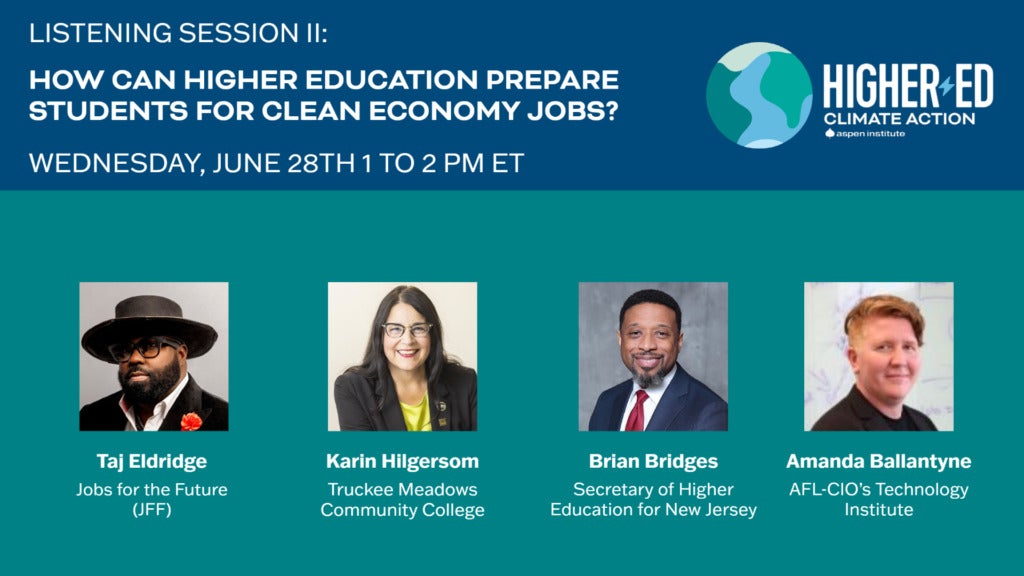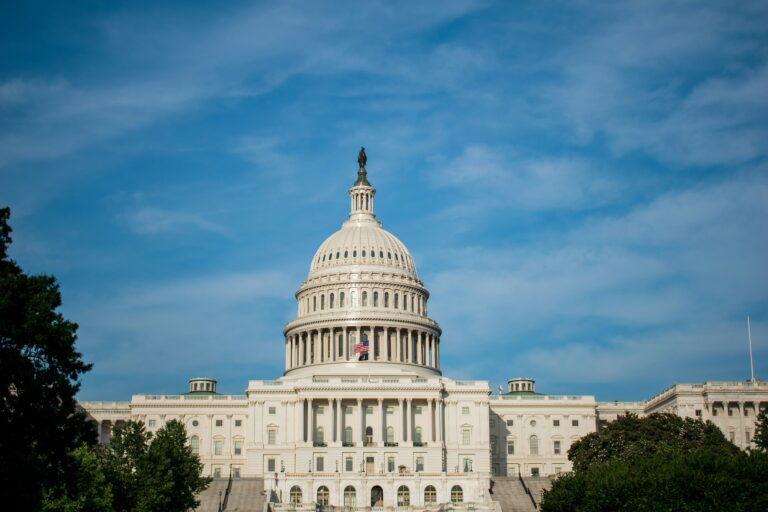 The Higher Ed Climate Action Task Force
The Higher Ed Climate Action Task Force
aims to accelerate higher education’s already impressive progress on climate, create an overarching framework for the role of higher education in advancing solutions, and identify policies to scale climate action. The Task Force, co-chaired by Commissioner of Higher Education for Louisiana, Dr. Kim Hunter Reed and President of AASCU, Dr. Mildred García, includes a diverse group of leaders from across the higher education and climate fields.
Over the next year, the Higher Ed Climate Action Task Force will host a virtual listening tour to better understand the work currently occurring and the opportunity to scale action across the sector. The task force will then draft an action plan grounded in what is learned from these sessions with recommendations for institutions, systems, and policymakers.
This session will focus on the challenges and opportunities facing higher education in preparing workers with skills for a new clean economy, including examining emerging trends in employer requirements, current successful apprenticeship programs and partnerships with businesses, and the quality of jobs for workers. We will hear about new avenues created by federal investments, and about how cross-sector collaboration can spur innovation and strengthen the workforce. We will discuss how to ensure equity in access to training, skills building and pathways to employment.
Speakers
Taj Ahmad Eldridge serves as Managing Director of Climate Innovations at Jobs For The Future (JFF) where he leads a cross-collaborative team focusing on the intersection of climate and workforce. The first project under Climate Innovations is the $25M, 5 year project CREST, funded by the Ares Management Foundation. Previously, he was Senior Director of Investments at the Los Angeles Cleantech Incubator (LACI), and prior to that he was the Director for the Incubator at the University of California in Riverside, California. He has built a career with expertise in the fields of fintech, media, energy, transportation, and the circular economy. Taj has been named one of the 53 Investors to Watch in 2021 by Pitchbook & 101 Black Titans in Tech while nurturing and building a team of investment activists.
Dr. Karin Hilgersom
serves as the president of Truckee Meadows Community College (TMCC), a predominantly two-year college with some bachelor’s degrees, and a Hispanic Serving Institution, serving the Reno-Sparks region. She has charted new directions for TMCC, including a college-wide commitment to campus sustainability. She is active in the Reno/Sparks community. She serves ex-officio on the Board of Directors of the Economic Development Authority of Western Nevada (EDAWN) and PBS Reno. She also serves as Board Chair for the nonprofit organization iCelerate, whose mission is to serve people with intellectual and developmental disabilities and the families who support them. She previously served as the president of SUNY Sullivan in Loch Sheldrake, NY. During her time at SUNY Sullivan, Dr. Hilgersom’s work included the Sullivan Solar Garden, a two-megawatt solar array that brought SUNY Sullivan close to carbon neutrality.
Brian Bridges, Ph.D., currently serves as Secretary of Higher Education for the state of New Jersey. Dr. Bridges is responsible for policy development and coordination of higher education activities for the state. He also coordinates initiatives to improve college affordability in New Jersey through the State Plan for Higher Education and enhance postsecondary opportunities while promoting equity and access for all through programs such as the state’s Community College Opportunity Grant (CCOG). Dr. Bridges previously served as Vice President of Research and Member Engagement at the United Negro College Fund (UNCF) in Washington, DC and led the UNCF Career Pathways Initiative to improve job placement outcomes at Historically Black Colleges and Universities (HBCUs) and Predominantly Black Institutions (PBIs). Prior to joining UNCF, Dr. Bridges served in various leadership roles both on- and off-campus, including Vice Provost for Diversity, Access, and Equity at Ohio University; Associate Director of the Center for Advancement of Racial and Ethnic Equity at the American Council on Education; and Associate Director at the National Survey of Student Engagement (NSSE). Dr. Bridges is a former Assistant Professor of Higher Education Administration at George Washington University.
Amanda Ballantyne is Executive Director of the AFL-CIO’s Technology Institute, where she works to develop strategies to engage workers in the innovation process. Prior to joining the AFL-CIO, she was Executive Director of the Main Street Alliance, a national network of small business owners and entrepreneurs focused on policy and employment issues. She brings nearly 20 years of organizing, policy and legal experience in unions and NGOs. Amanda Ballantyne graduated from Smith College and earned her law degree from the University of Washington School of Law.
 The Higher Ed Climate Action Task Force
The Higher Ed Climate Action Task Force
aims to accelerate higher education’s already impressive progress on climate, create an overarching framework for the role of higher education in advancing solutions, and identify policies to scale climate action. The Task Force, co-chaired by Commissioner of Higher Education for Louisiana, Dr. Kim Hunter Reed and President of AASCU, Dr. Mildred García, includes a diverse group of leaders from across the higher education and climate fields.
Over the next year, the Higher Ed Climate Action Task Force will host a virtual listening tour to better understand the work currently occurring and the opportunity to scale action across the sector. The task force will then draft an action plan grounded in what is learned from these sessions with recommendations for institutions, systems, and policymakers.
This session will focus on the challenges and opportunities facing higher education in preparing workers with skills for a new clean economy, including examining emerging trends in employer requirements, current successful apprenticeship programs and partnerships with businesses, and the quality of jobs for workers. We will hear about new avenues created by federal investments, and about how cross-sector collaboration can spur innovation and strengthen the workforce. We will discuss how to ensure equity in access to training, skills building and pathways to employment.
Speakers
Taj Ahmad Eldridge serves as Managing Director of Climate Innovations at Jobs For The Future (JFF) where he leads a cross-collaborative team focusing on the intersection of climate and workforce. The first project under Climate Innovations is the $25M, 5 year project CREST, funded by the Ares Management Foundation. Previously, he was Senior Director of Investments at the Los Angeles Cleantech Incubator (LACI), and prior to that he was the Director for the Incubator at the University of California in Riverside, California. He has built a career with expertise in the fields of fintech, media, energy, transportation, and the circular economy. Taj has been named one of the 53 Investors to Watch in 2021 by Pitchbook & 101 Black Titans in Tech while nurturing and building a team of investment activists.
Dr. Karin Hilgersom
serves as the president of Truckee Meadows Community College (TMCC), a predominantly two-year college with some bachelor’s degrees, and a Hispanic Serving Institution, serving the Reno-Sparks region. She has charted new directions for TMCC, including a college-wide commitment to campus sustainability. She is active in the Reno/Sparks community. She serves ex-officio on the Board of Directors of the Economic Development Authority of Western Nevada (EDAWN) and PBS Reno. She also serves as Board Chair for the nonprofit organization iCelerate, whose mission is to serve people with intellectual and developmental disabilities and the families who support them. She previously served as the president of SUNY Sullivan in Loch Sheldrake, NY. During her time at SUNY Sullivan, Dr. Hilgersom’s work included the Sullivan Solar Garden, a two-megawatt solar array that brought SUNY Sullivan close to carbon neutrality.
Brian Bridges, Ph.D., currently serves as Secretary of Higher Education for the state of New Jersey. Dr. Bridges is responsible for policy development and coordination of higher education activities for the state. He also coordinates initiatives to improve college affordability in New Jersey through the State Plan for Higher Education and enhance postsecondary opportunities while promoting equity and access for all through programs such as the state’s Community College Opportunity Grant (CCOG). Dr. Bridges previously served as Vice President of Research and Member Engagement at the United Negro College Fund (UNCF) in Washington, DC and led the UNCF Career Pathways Initiative to improve job placement outcomes at Historically Black Colleges and Universities (HBCUs) and Predominantly Black Institutions (PBIs). Prior to joining UNCF, Dr. Bridges served in various leadership roles both on- and off-campus, including Vice Provost for Diversity, Access, and Equity at Ohio University; Associate Director of the Center for Advancement of Racial and Ethnic Equity at the American Council on Education; and Associate Director at the National Survey of Student Engagement (NSSE). Dr. Bridges is a former Assistant Professor of Higher Education Administration at George Washington University.
Amanda Ballantyne is Executive Director of the AFL-CIO’s Technology Institute, where she works to develop strategies to engage workers in the innovation process. Prior to joining the AFL-CIO, she was Executive Director of the Main Street Alliance, a national network of small business owners and entrepreneurs focused on policy and employment issues. She brings nearly 20 years of organizing, policy and legal experience in unions and NGOs. Amanda Ballantyne graduated from Smith College and earned her law degree from the University of Washington School of Law.











